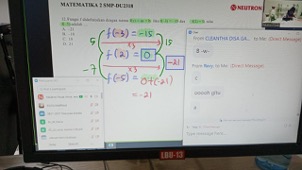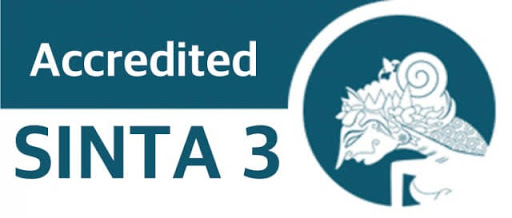Describing remote learning at Neutron Yogyakarta tutoring institution
DOI:
https://doi.org/10.12928/ijei.v2i2.5528Keywords:
informal education, remote learning, tutoring institutionAbstract
This study aims to describe the activities of remote learning at the tutoring institution (Lembimjar) Neutron Yogyakarta. This research was conducted at the head office of Lembimjar Neutron Yogyakarta using descriptive qualitative research methods. The subjects in the study were staff and teachers who were involved in remote learning. Data collection techniques through direct observation and unstructured interviews. The implementation of remote learning is carried out by collaborating with interactive live streaming learning through Zoom Meetings and programmatic consultation. Activities for remote learning as a form of adaptive learning during the COVID-19 pandemic.
References
Anam, C., & Maghfiroh, R. L. (2021). Pengaruh Electronic Word of Mouth (E-Wom), Kualitas Pelayanan Dan Fasilitas Terhadap Keputusan Pembelian Jasa (Studi Kasus: Bimbingan Belajar Sony Sugema Collage Area Jombang). Jurnal Ilmiah Ekonomi dan Bisnis Triangle, 2(2), 142-155.
Kisno, K., Calen, C., Tampubolon, M. R., Manalu, T. S., Berlien, R., Gulo, K. N., & Kešner, A. (2021). Teachers’ Learning Loss Diminution Through Self-Phased Learning with Guru Binar. Indonesian Journal of Educational Studies, 24(1), 17-26.
Kriyantono, R. (2007). Teknik Praktis Riset Komunikasi. Jakarta: Kencana.
Nawawi, H. (1991). Metode Penelitian Bidang Sosial. Yogyakarta: Gajah Mada University Press.
Pakpahan, R., & Fitriani, Y. (2020). Analisa pemanfaatan teknologi informasi dalam pembelajaran jarak jauh di tengah pandemi virus corona covid-19. Journal of Information System, Applied, Management, Accounting and Research, 4(2), 30-36.
Sakti, S. A. (2021). Persepsi Orang Tua Siswa terhadap Pembelajaran Daring pada Masa Pandemi Covid 19 di Yogyakarta. Jurnal Obsesi: Jurnal Pendidikan Anak Usia Dini, 6(1), 73-81.
Samsu, S. (2017). Metode Penelitian (Teori Dan Aplikasi Penelitian Kualitatif, Kuantitatif, Mixed Methods, Serta Research & Development). Jambi: UIN Jambi.
Serhan, D. (2020). Transitioning from face-to-face to remote learning: Students’ attitudes and perceptions of using Zoom during COVID-19 pandemic. International Journal of Technology in Education and Science, 4(4), 335-342.
Setiawan, A. R. (2020). Lembar kegiatan literasi saintifik untuk pembelajaran jarak jauh topik penyakit coronavirus 2019 (COVID-19). Edukatif: Jurnal Ilmu Pendidikan, 2(1), 28-37.
Sinerjaya, S., & Fitra, A. (2021). Analisis Kesulitan Pembelajaran Daring dengan Whatsapp. Jurnal MathEducation Nusantara, 4(2), 24-32.
Sugiyono. (2017). Metode Penelitian Kuantitatif, Kualitatif, dan R&D. Bandung: Alfabeta.
Sukmadinata, N. S. (2005). Metode Penelitian Pendidikan. Bandung: Remaja Rosdakarya.
Thorik, S. H. (2020). Efektivitas pembatasan sosial berskala besar di Indonesia dalam penanggulangan pandemi covid-19. Adalah, 4(1), 115-120.
Wang Z, Qiang W, Ke H. (2020). A handbook of 2019-nCoV pneumonia control and prevention. China: Hubei Science and Technology Press.
WHO. (2020). Novel Coronavirus (2019-nCoV) Situation Report-1. Geneva: WHO.
Yusuf, A. (2017). Prosedur Penelitian Suatu Pendekatan Praktek (4th ed). Jakarta: Kencana.

Downloads
Published
How to Cite
Issue
Section
License
Copyright (c) 2022 Dinda Genius Anggun Maretha, Faisa Nirbita Mahmudah, Muhammad Naufal Husni Ahlam, Rofiif Mahardhika Putra, Burhanudin Arif Nurnugroho

This work is licensed under a Creative Commons Attribution-ShareAlike 4.0 International License.
Authors who publish with this journal agree to the following terms:
- Authors retain copyright with the work simultaneously licensed under a Creative Commons Attribution License that allows others to share the work with an acknowledgement of the work's authorship and initial publication in this journal.
- Authors are able to enter into separate, additional contractual arrangements for the non-exclusive distribution of the journal's published version of the work (e.g., post it to an institutional repository or publish it in a book), with an acknowledgement of its initial publication in this journal.
- Authors are permitted and encouraged to post their work online (e.g., in institutional repositories or on their website) prior to and during the submission process, as it can lead to productive exchanges, as well as earlier and greater citation of published work (See The Effect of Open Access).




